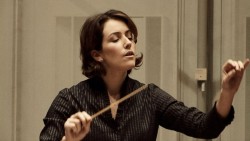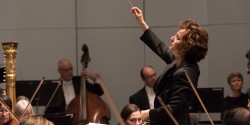 Filming the work of an orchestra is not an easy job. The television series Mozart in the Jungle, about a fictional orchestra, focuses on a handful of individuals to tell the broader story. Dutch documentary Around the World in 50 Concerts (dir. Heddy Honigmann, 2014) follows the Royal Concertgebouw Orchestra on tour and looks at the orchestra’s work in a roundabout way, by talking to music lovers about how they experience the music they hear. While both creations have much to recommend them, neither is quite as exciting as the orchestral music-making itself—and neither exactly capture the contingency, the heartache and the unpredictability of a career in music.
Filming the work of an orchestra is not an easy job. The television series Mozart in the Jungle, about a fictional orchestra, focuses on a handful of individuals to tell the broader story. Dutch documentary Around the World in 50 Concerts (dir. Heddy Honigmann, 2014) follows the Royal Concertgebouw Orchestra on tour and looks at the orchestra’s work in a roundabout way, by talking to music lovers about how they experience the music they hear. While both creations have much to recommend them, neither is quite as exciting as the orchestral music-making itself—and neither exactly capture the contingency, the heartache and the unpredictability of a career in music.
Conduct! Every Move Counts, screened in Toronto on Tuesday, November 21 at the Hot Docs Ted Rogers Cinema as part of the cinema and the Royal Conservatory’s Music on Film series, made me think of these earlier examples because this 2016 German documentary about the Georg Solti Conductors’ Competition comes closer to both the glory and the gore. It zooms in on a few candidates (I presume the team interviewed many more of the 24 conductors selected for the 2008 competition before deciding who to follow), and while the winner did turn out to be among them, the documentary centres on the “losing” candidates and their personalities and musicianship, which they have in bucket-loads. The winner too comes across as an interesting character – Shizuo Kuwahara, who at first stands out for his bizarre arm gestures and grimacing, but who eventually convinces the orchestra (of the Frankfurt Opera), the jury, the audience on the final night as well as the doc viewers of the seriousness of his approach.
Still, he remains in the background. Foreground is occupied by the then little-known, now established conductors Alondra de la Parra (who doesn’t make it to the second round, and who in the cab on the way back to the airport says on camera: “I shouldn’t have done it. I already have my orchestra, I already conduct – I really didn’t need this”), James Lowe, Andreas Hotz, and the “dark horse” figure in this film, the very young Aziz Shokhakimov. Shokhakimov and Lowe become fast friends and the camera captures them a few times playing the “guess the symphony by my hand movement” game.
The director, Götz Schauder, managed to access and film the jury’s pre-selection of candidates, the rounds of the competition which are not open to the public, jury deliberations, the announcement of results, and of course, the final, public round at the Frankfurt Opera. On the candidates’ side, in addition to the on-camera interviews, there was access to their hotel rooms, prep time, off time, waiting time and the feedback conversations – including one particularly memorable one in which the orchestra’s first violinist tries to explain to Shokhakimov that he should try to be less cocky and listen more, since he just couldn’t fix a problem in a particular section in rehearsal.
This documentary is not afraid to go into details: there is a lot of useful footage on the nitty-gritty of the work of conducting and playing in an orchestra. There are also some surprises along the way, but after all is said and done, the reasoning of the jury remains looking fairly arbitrary, or mysterious at best. Competitions are there to drum up media interest and the excitement of the public, and to give a boost to the careers of musicians who don’t have connections or a big agency behind them. At the same time, competitions can be as arbitrary as awards and auditions, dependent on multiple other factors besides candidate’s musicianship and potential.
 In the post-screening Q&A at the Hot Docs Ted Rogers Cinema, conductor Tania Miller talked about her own experiences with competitions – and as a young conductor, she’s tried some, including one that was won by the then still little-known Gustavo Dudamel. The Music on Film Series MC, the Royal Conservatory’s Mervon Mehta, asked her about her take on why there are still few women making a career in conducting, and she said she perceived three main reasons. First, the business side of a career in classical music: agencies, labels and media boost what they know and what’s been profitable so far, and that will be men. Second, some of the women conductors just out of school will not feel confident enough faced with what looks like an awe-inducing, largely male monolith – the classical music canon and the people whose job is to run it and write about it – and will need a confidence boost which may not come from anywhere. ‘Well, if nobody else is willing to believe in me, they must be right and I must be wrong,’ is the kind of thinking that may make a woman conductor change careers. And third, Miller said, is in part a matter of choice. It’s not an easy road to take. Alondra de la Parra says at one point in the documentary that she is studying scores from early morning to late in the evening, “and I believe her,” said Miller. “It is actually like that.” Miller went on to say that, if you want a family as an aspiring conductor, you must be extremely lucky to have an accommodating partner who is willing to do a lion’s share of child-rearing and relationship maintenance.
In the post-screening Q&A at the Hot Docs Ted Rogers Cinema, conductor Tania Miller talked about her own experiences with competitions – and as a young conductor, she’s tried some, including one that was won by the then still little-known Gustavo Dudamel. The Music on Film Series MC, the Royal Conservatory’s Mervon Mehta, asked her about her take on why there are still few women making a career in conducting, and she said she perceived three main reasons. First, the business side of a career in classical music: agencies, labels and media boost what they know and what’s been profitable so far, and that will be men. Second, some of the women conductors just out of school will not feel confident enough faced with what looks like an awe-inducing, largely male monolith – the classical music canon and the people whose job is to run it and write about it – and will need a confidence boost which may not come from anywhere. ‘Well, if nobody else is willing to believe in me, they must be right and I must be wrong,’ is the kind of thinking that may make a woman conductor change careers. And third, Miller said, is in part a matter of choice. It’s not an easy road to take. Alondra de la Parra says at one point in the documentary that she is studying scores from early morning to late in the evening, “and I believe her,” said Miller. “It is actually like that.” Miller went on to say that, if you want a family as an aspiring conductor, you must be extremely lucky to have an accommodating partner who is willing to do a lion’s share of child-rearing and relationship maintenance.
Greatest laugh of the evening? Mervon Mehta describing seasoned orchestra players as, on principle, “cranky bastards.” “Not the Royal Conservatory Orchestra,” interjected Miller. “Yes, not them, because they’re still students,” said Mehta to another wave of audience laughter.
The Music on Film series continues on January 30 with Strad Style, a documentary about an Ohio-based, Stradivari-obsessed violin maker, and February 27 with a bio-doc dedicated to Miriam Makeba, Mama Africa. Full program for Music on Film can be found here.
Lydia Perović is an arts journalist in Toronto.



